疑问代词、疑问副词、关系代词、关系副词、连接代词、连接副词、并列连词与从属连词等概念区别及关系图
- 格式:docx
- 大小:125.55 KB
- 文档页数:2
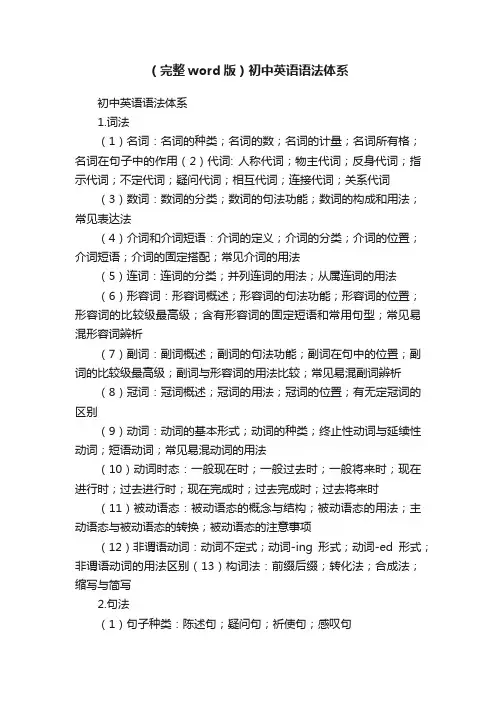
(完整word版)初中英语语法体系初中英语语法体系1.词法(1)名词:名词的种类;名词的数;名词的计量;名词所有格;名词在句子中的作用(2)代词: 人称代词;物主代词;反身代词;指示代词;不定代词;疑问代词;相互代词;连接代词;关系代词(3)数词:数词的分类;数词的句法功能;数词的构成和用法;常见表达法(4)介词和介词短语:介词的定义;介词的分类;介词的位置;介词短语;介词的固定搭配;常见介词的用法(5)连词:连词的分类;并列连词的用法;从属连词的用法(6)形容词:形容词概述;形容词的句法功能;形容词的位置;形容词的比较级最高级;含有形容词的固定短语和常用句型;常见易混形容词辨析(7)副词:副词概述;副词的句法功能;副词在句中的位置;副词的比较级最高级;副词与形容词的用法比较;常见易混副词辨析(8)冠词:冠词概述;冠词的用法;冠词的位置;有无定冠词的区别(9)动词:动词的基本形式;动词的种类;终止性动词与延续性动词;短语动词;常见易混动词的用法(10)动词时态:一般现在时;一般过去时;一般将来时;现在进行时;过去进行时;现在完成时;过去完成时;过去将来时(11)被动语态:被动语态的概念与结构;被动语态的用法;主动语态与被动语态的转换;被动语态的注意事项(12)非谓语动词:动词不定式;动词-ing形式;动词-ed形式;非谓语动词的用法区别(13)构词法:前缀后缀;转化法;合成法;缩写与简写2.句法(1)句子种类:陈述句;疑问句;祈使句;感叹句(2)句子成分:主语;谓语;主谓一致;表语;宾语;宾语补足语;定语;状语;同位语;独立成分(3)简单句的基本句型:主语+连系动词+表语;主语+不及物动词;主语+及物动词+宾语;主语+及物动词+宾语+宾语补足语;主语+及物动词+间接宾语+直接宾语;there be句型(4)并列复合句:并列句;复合句;并列复合句(5)主从复合句:宾语从句;状语从句;定语从句(6)直接引语与间接引语:概述;直接引语与间接引语的转换。
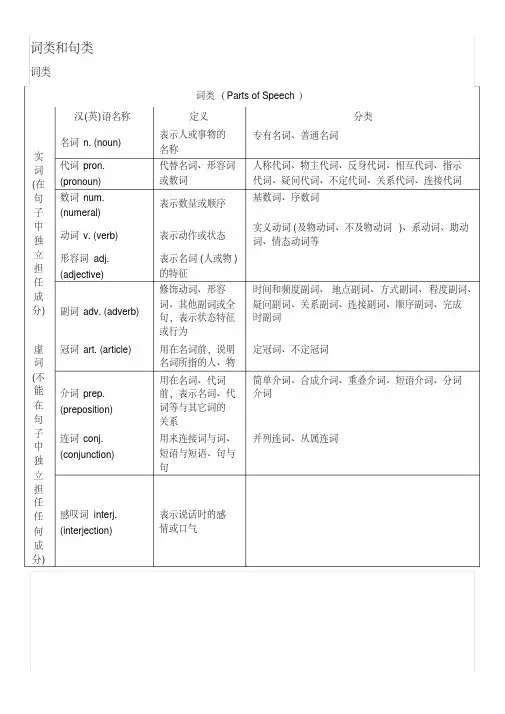

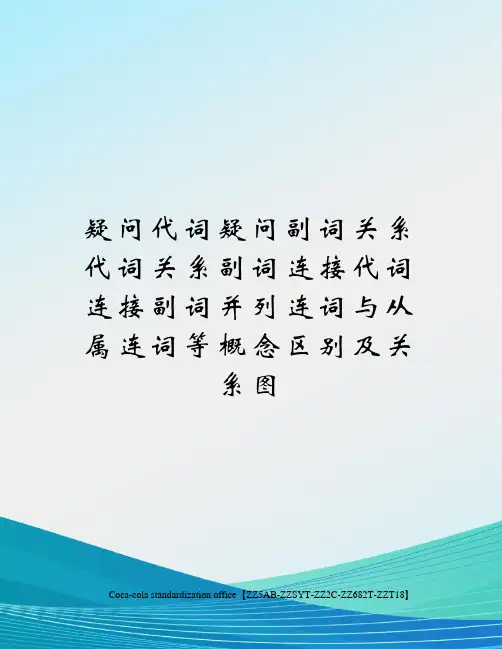
疑问代词疑问副词关系代词关系副词连接代词连接副词并列连词与从属连词等概念区别及关系图Coca-cola standardization office【ZZ5AB-ZZSYT-ZZ2C-ZZ682T-ZZT18】④ 既可做“介词”,也可做“连词”的词:for 、since 、until 、before 、after 等。
for 介词P93 并列连词(因果推理关系)P103 介词P93 从属连词(时间、原因状从)P105 since 介词P93~94 从属连词(时间状从)P105 until 、before 、after ③ 介词后接 (一般接名词或代词) 形容词 参考 《介词后接形容词的几种情况》——雍《论介词宾语的语法结构》——熊从句(作宾语从句) 参考 《论介词宾语的语法结构》——熊《介词宾语从句种种》——洪《漫谈英语介词的宾语从句》——袁春② 既可“表疑问”,也可“不表疑问”的连接词:whomever 、whoever 等。
特殊点:① 连接代普通连接代词 ——表疑问复合式连接代词——不表疑问连接副词 连接从句的连接副连接分句的连接副词 参考 《论介词宾语的语法结构》——熊《介词宾语从句种种》——洪淑治 《漫谈英语介词的宾语从句》——袁P96①例句——连接副词 不表疑问的 介词宾语从比较 区别疑问代词 区别疑问副词单独句子——疑问代词(5个词)P42,疑问副词(7个词)连接 句子与“句子”的 名词性从句(4大从句)连词P101 从属连词 “that 、if 、whether 状语从句(9大类) 并列连连接两个分句(4种关系) 介词 P96 一些特殊的介词(如but 、except 连接副词 连接分句 连接从句 (不表疑问) 代词P45表疑问连接代词 不表疑问 关系代词(6个词) 关系副词(3个词) 定语从句[5大成分+1修饰整句]副词 P130 分句 从句句子 注:⑦ 《谈名词、副词、分词和短语作从属连词的现象》——赵莉 ⑥ 同时可引导多种状语从句的从属连词:so 、so that 、as 、since 等。
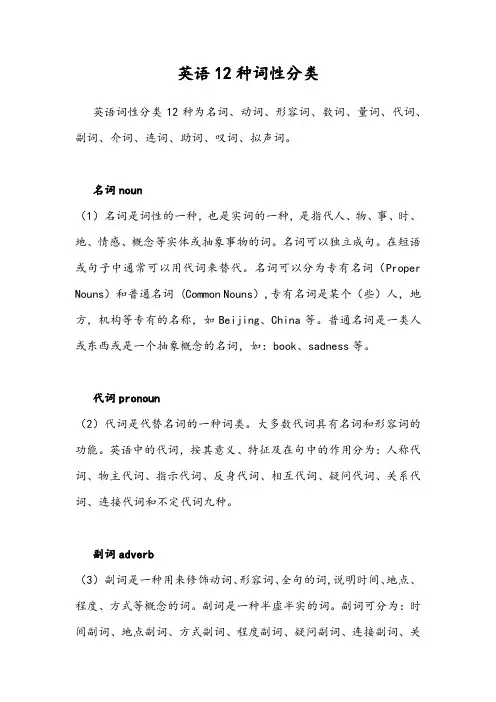
英语12种词性分类英语词性分类12种为名词、动词、形容词、数词、量词、代词、副词、介词、连词、助词、叹词、拟声词。
名词noun(1)名词是词性的一种,也是实词的一种,是指代人、物、事、时、地、情感、概念等实体或抽象事物的词。
名词可以独立成句。
在短语或句子中通常可以用代词来替代。
名词可以分为专有名词(Proper Nouns)和普通名词 (Common Nouns),专有名词是某个(些)人,地方,机构等专有的名称,如Beijing、China等。
普通名词是一类人或东西或是一个抽象概念的名词,如:book、sadness等。
代词pronoun(2)代词是代替名词的一种词类。
大多数代词具有名词和形容词的功能。
英语中的代词,按其意义、特征及在句中的作用分为:人称代词、物主代词、指示代词、反身代词、相互代词、疑问代词、关系代词、连接代词和不定代词九种。
副词adverb(3)副词是一种用来修饰动词、形容词、全句的词,说明时间、地点、程度、方式等概念的词。
副词是一种半虚半实的词。
副词可分为:时间副词、地点副词、方式副词、程度副词、疑问副词、连接副词、关系副词、频率副词和说明性副词等。
动词 verb(4)动词是表示动作、行为、心理活动或存在变化等的词。
例如:表示动作行为:走、坐、听、看、批评、宣传、保卫、学习、研究、进行、开始、停止、禁止。
介词 preposition(5)介词(preposition 简写prep.)又称作前置词,表示名词、代词等与句中其他词的关系,在句中不能单独作句子成分。
介词后面一般有名词、代词或相当于名词的其他词类、短语或从句作它的宾语,表示与其他成分的关系。
介词和它的宾语构成介词词组,在句中作状语,表语,补语,定语或介词宾语。
同时介词的用法也很灵活,同一个介词可以表达多种意义,介词可以分为时间介词、地点介词、方式介词、原因介词、数量介词和其他介词。
形容词 adjective(6)形容词是表示人和事物的形状、性质或表示动作、行为的性质状态的词。
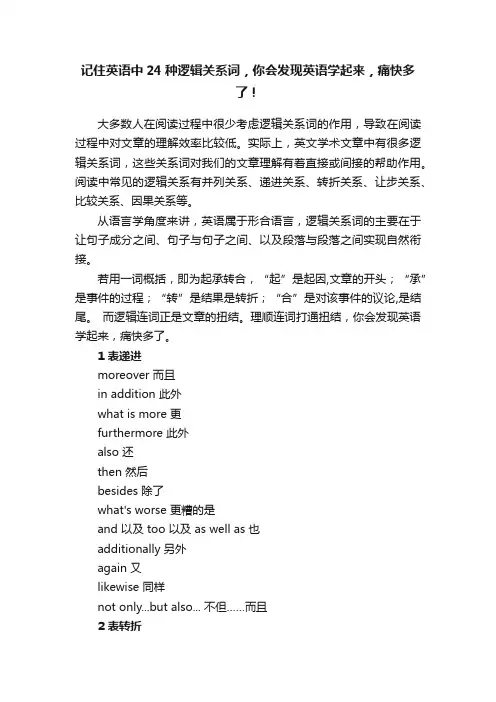
记住英语中24种逻辑关系词,你会发现英语学起来,痛快多了!大多数人在阅读过程中很少考虑逻辑关系词的作用,导致在阅读过程中对文章的理解效率比较低。
实际上,英文学术文章中有很多逻辑关系词,这些关系词对我们的文章理解有着直接或间接的帮助作用。
阅读中常见的逻辑关系有并列关系、递进关系、转折关系、让步关系、比较关系、因果关系等。
从语言学角度来讲,英语属于形合语言,逻辑关系词的主要在于让句子成分之间、句子与句子之间、以及段落与段落之间实现自然衔接。
若用一词概括,即为起承转合,“起”是起因,文章的开头;“承”是事件的过程;“转”是结果是转折;“合”是对该事件的议论,是结尾。
而逻辑连词正是文章的扭结。
理顺连词打通扭结,你会发现英语学起来,痛快多了。
1 表递进moreover 而且in addition 此外what is more 更furthermore 此外also 还then 然后besides 除了what's worse 更糟的是and 以及 too 以及 as well as 也additionally 另外again 又likewise 同样not only...but also... 不但……而且2 表转折however 但nevertheless 虽然on the other hand 另一方面on the contrary 反之rather than 而不是instead of 而不是but 但是yet 但是unfortunately 不幸的是whereas 而although 虽然though 虽然otherwise 否则by contrast 反之,通过对比at the same time 与此同时despite 尽管even so 即便如此in contrast 相比较even though 即使所有for all that 所有not with standing 尽管如此in spite of 尽管last but not least 最后但并非最不重要instead 代替thus 从而what is more 更;而且not only...but also 不但……而且……still 仍然in contrast to 相比较regardless 无论;不管while 而different from 不同的是for all that 尽管,虽然如此or 要不;否则;或者notwithstanding 虽然even though 即使despite 尽管after all 毕竟except (for) 除了of course 固然;尽管;当然some...others 一些、另外的on the other hand 另一方面once 以前now 现在the first...whereas the second 第一……而第二then...now 然后……现在the former...the latter 前者……后者finally 最后;最终here...there 这里……那里so 因此3 表层次on the one hand 一方面on the other hand 另一方面first 首先 second 其次finally 最后firstly 首先secondly 其次then 然后to begin with 首先further 进一步and…equally important 和同样重要in addition 此外in the first place 首先still 仍然furthermore 此外what is more 更;而且last but not least 最后但并非最不重要secondly 其次and then 进而next 接着to start with 开始besides 除了moreover 而且finally 最后4 表强调in fact 其实indeed 的确actually 其实as a matter of fact 事实上apparently 显然emphasis 强调chiefly 主要是primarily 主要in particular 尤其是surely 一定n any case 不管怎么样especially 特别是clearly 显然without any doubt 毫无疑问to repeat 重复no doubt 毫无疑问needless to say 不用说undoubtedly 无疑absolutely 绝对still 仍oddly enough 奇怪的是of course 当然after all 毕竟significantly 显著interestingly 有趣的是also 也above all 首先certainly 当然anyway 无论如何obviously 明显necessarily 要紧;一定truly 真正most important 最重要的是particularly 尤其most important of all 最重要的是5 表结果和原因evidently 明显地first of all 首先undoubtedly 无疑without any shadow of doubt 毫无疑问thus 从而hence 故;从此so 因此therefore 因此accordingly 因此;所以;从而consequently 所以since = now that 自从as 因为for the reason 由于;因为so that 以便as consequence 所以as a result 结果;因此on this / that account 于是such that 如此in this way 这样because 因为since 自从otherwise 否则Cause and effect) for 由于because of = thanks to= due to = owing to 由于for this reason 为此on account of 考虑到as a consequence 结果for as a consequence 后果6 表结尾therefore 因此then 然后;因此;那么accordingly 从而because (of) 由于or 因为thanks to 由于hence 因此as a result of 结果consequently 所以thus 因而since 自从owing to 由于for the reason that 因为7 表举例in a word 总之therefore 因此sum up 总之such as 例如to begin with 首先besides 此外for one thing 首先;一方面in conclusion 总之;最后in short 总之;简而言之as a case in point 作为一个很好的例子first of all 首先furthermore 此外in addition 此外for another 另外8 表比较similarly 同样likewise 同样like 像……一样equally 一样compared 相比…in a like manner 以类似的方式just as 正如however 可是in the same way 以同样的方式in the same manner 以同样的方式in comparison 相比较in contrast 与此相反in comparison 相比较just like 就像similar to 类似the same as 同…一样9 表对比by contrast 通过对比on the contrary 反之while 而whereas 而unlike 不像instead 代替but 但conversely 反过来different from 不同的是however 但in a sharp contrast 鲜明对比的是in contrast 相比较;相对于even though 即使,即便如此on the other hand 另外on the one hand 一方面otherwise 否则as opposed to 相对于while 而yet 但by comparison 通过比较similarly 同样nevertheless 虽然still 仍然in spite of 尽管10 表举例for example 例如for instance 例如in other words 换句话说in this case 在这种情况下as an example 作为一个例子take… for example 例如say namely 比如after all 毕竟except (for) 除了like… 就比如…,正如…to illustrate as an illustration 作为一个例子来说明by way of illustration 以说明的方式to illustrate 说明to name a few 仅举几例11 表时间later 后来lately 终于next 接着then 然后soon 不久immediately 立刻;随即meanwhile 与此同时finally 最后at last 最后 eventually 终于since 自从lately 最近afterward 之后temporarily 暂时earlier 最初 now 现在first 首先again 又also 也before 以前besides 除了formerly 以前further 进一步furthermore 此外last 最后simultaneously 同时shortly 不久still 仍然subsequently 随后thereafter 此后until 直到 recently 最近after 以后gradually 慢慢的;逐渐till 直到when 当……时nowadays 目前now presently 目前during 在……期间now and then 偶尔in the meanwhile 同时in the meantime 在此期间in the end 到底in addition 此外in the first place 首先in the past 在过去in a few days 几天之内after a few days 几天以后at that time 当时as long as 只要as soon as 一……就at present 目前at the same time 同时at length 最后at first 起初from now on 今后from then on 从那时起so far 到目前为止for the time being 暂时;眼下when now 当下and then 进而to begin with/ to start with 首先at that moment 在那一刻suddenly = all of a sudden 突然until now 直到现在after that 之后not…until 不…直到while 一会儿12 表顺序first 首先second 其次then 其次,然后finally 最后last 最终,最后next 接着after 以后earlier 最初later 后来behind 后面beside 旁边beyond 外面above 以上below 以下to begin with 首先first of all 首先in the first place 首先above all 首先in the end 到底at last 最后first and most important 首先且最重要的last but not the least 最后但并非最不重要near(to) 靠近far(from)远离in front of 前面in the middle 中间to the right (left)到右(左)边on the other side 另一面opposite 反面13 表可能presumably 想必probably 大概perhaps 也许therefore 因此so 所以as a result(of) 作为结果accordingly 因而otherwise 否则maybe 可能14 表解释in other words 换句话说in fact 其实in simpler terms 简单地说in this case 在这种情况下 in addition 此外in fact/ as a matter of fact / actually 其实another way 另一种方式to tell you the truth 实话告诉你as a matter off act 事实上that is 就是说for example 例如for instance 例如frankly speaking 坦白的说now 既然namely 即,意即actually 实际上to put it differently 换句话说that is to say 也就是说15 表让步admittedly 诚然whatever 无论hence 因此nevertheless 然而as 虽然though 虽然 although 尽管despite 尽管in spite of... 尽管even though 尽管even if 即使even so 即便如此granted 就算如此 naturally 自然however 无论如何still 仍然provided 假如or 或者whenever 无论何时 whoever 无论谁wherever 无论哪里whether 不论;或者whichever 无论哪一个after all 毕竟while it is true 虽然这是事实no matter how (who, what, which, where) 无论多么(谁,什么,哪一个,哪里)all the same 仍然 of course 当然16 表总结accordingly 因此therefore 因此thus 因此altogether to conclude 完全可以说general 一般specially 特别finally 终于namely 也就是indeed 的确in other words 换句话说thus 因此altogether 总而言之all in all 总之in consequence 结果in sum 总之consequently 因此hence 因此so 因此the point is 关键是obviously 显然of course 当然differently 不同的是as a result 结果as for me 依我之见to some extent 在某种程度上on the whole 大体上in conclusion 总之in a word 一句话in brief 简言之in summary 总之in general 一般来说in short 简而言之in other word 也就是in my opinion 在我看来in a word 总的来说in all 总的来说in fact 事实上in simpler terms 简单地说in my view 在我看来in particular 特别是it is true 事实上at last 最后as I have shown 正如我所表明的as has been stated generally speaking 正如所说as has been said 如上所述as far as I am concerned 就我而言as what has been mentioned 正如已经提到的to sum up 总之to summarize 简而言之to conclude 总而言之to put it differently 换句话说17 其他类型连接词mostly 通常occasionally 偶尔currently 一般naturally 自然mainly 主要exactly 完全in this case 在这种情况下frankly 坦率地说commonly 通常for this purpose 为此to a large extent 在很大程度上for most of us 对于我们大多数人evidently 显然in many cases 在许多情况下18 表示时间与频率的词汇every 每一some 一些after 以后usually 通常almost 几乎frequently 经常mainly 主要finally 最后rarely 难得;很少;几乎不before 之前on the whole 大体上at other times 平时in most cases 在大多数情况下in general 一般来说as a rule 一般说来meanwhile 与此同时always 总是often 经常19 表示附加的词additionally 此外as well as 以及just as 正如again 再次along with 连同also 并且besides 除此之外further 进一步furthermore 此外in the same manner 同样地in the same way 同样地in addition to 除…之外20 表示增加的过渡词also 也so that 为了;目的是and 以及and then 于是in addition 除了another 另一个again 再次on top of 另外moreover 此外first 首先furthermore 此外second 其次too 也third 再次21 表示目的的过渡词lest 唯恐for this reason 为此furthermore 此外for this purpose 为了这个目的again 再次so as to 以便also 也so that 所以besides 除了in order that 为了similarly 同样in addition 此外moreover 此外what’s more 不仅如此next 接着finally 最后22 表示并列关系or, and, also, too 也not only … but also… 不但……而且as well as 以及so…that 太…以至于both… and… 既……又either …or… 或者…或者neither…nor… 既不……也不23 表示并列补充关系what is more 而且;此外also 还besides 除了as well 也;此外moreover 此外furthermore 此外in addition 此外24 表示条件关系as (so) long as 只要if 假如 unless 除非eventually 终于presently 目前somewhat 有点;稍微as if 仿佛by the way of 通过这种方式on condition that 如果on the condition 只要or else 要不然in the meantime 与此同时from then on 从那时起after an interval 一段时间后all of a sudden 一下子on the contrary 相反在会议的商务人士。
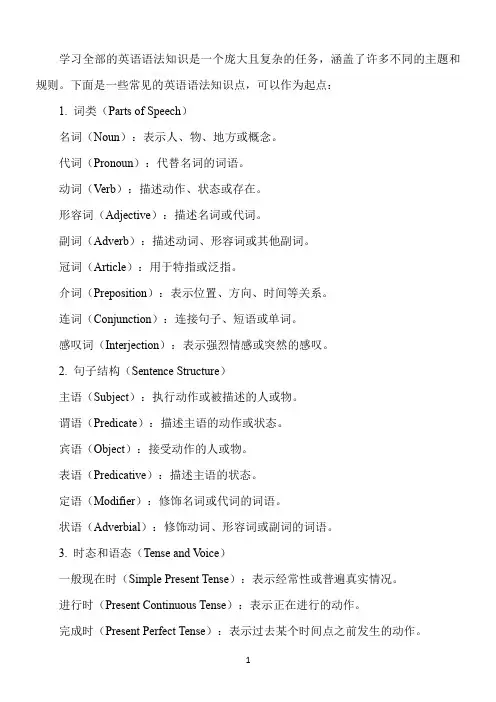
学习全部的英语语法知识是一个庞大且复杂的任务,涵盖了许多不同的主题和规则。
下面是一些常见的英语语法知识点,可以作为起点:1. 词类(Parts of Speech)名词(Noun):表示人、物、地方或概念。
代词(Pronoun):代替名词的词语。
动词(Verb):描述动作、状态或存在。
形容词(Adjective):描述名词或代词。
副词(Adverb):描述动词、形容词或其他副词。
冠词(Article):用于特指或泛指。
介词(Preposition):表示位置、方向、时间等关系。
连词(Conjunction):连接句子、短语或单词。
感叹词(Interjection):表示强烈情感或突然的感叹。
2. 句子结构(Sentence Structure)主语(Subject):执行动作或被描述的人或物。
谓语(Predicate):描述主语的动作或状态。
宾语(Object):接受动作的人或物。
表语(Predicative):描述主语的状态。
定语(Modifier):修饰名词或代词的词语。
状语(Adverbial):修饰动词、形容词或副词的词语。
3. 时态和语态(Tense and V oice)一般现在时(Simple Present Tense):表示经常性或普遍真实情况。
进行时(Present Continuous Tense):表示正在进行的动作。
完成时(Present Perfect Tense):表示过去某个时间点之前发生的动作。
一般过去时(Simple Past Tense):表示过去发生的动作或状态。
过去进行时(Past Continuous Tense):表示过去某个时间段内正在进行的动作。
过去完成时(Past Perfect Tense):表示过去某个时间点之前已经完成的动作。
将来时(Future Tense):表示将来要发生的动作。
被动语态(Passive V oice):强调动作的承受者而非执行者。
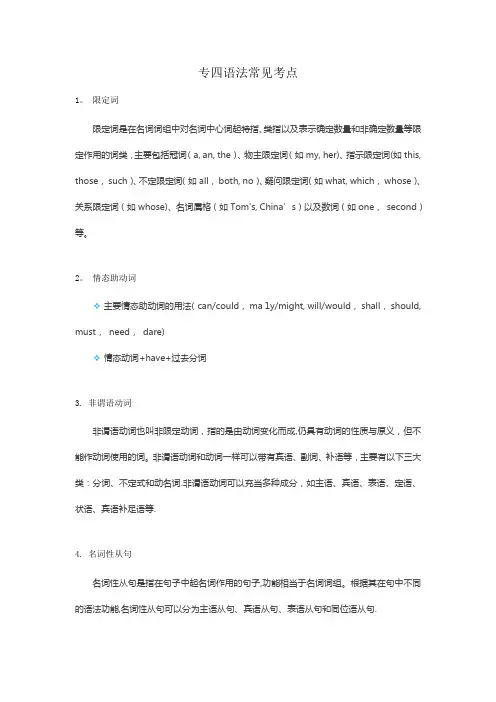
专四语法常见考点1。
限定词限定词是在名词词组中对名词中心词起特指、类指以及表示确定数量和非确定数量等限定作用的词类,主要包括冠词(a, an, the)、物主限定词(如my, her)、指示限定词(如this, those,such)、不定限定词(如all,both, no)、疑问限定词(如what, which,whose)、关系限定词(如whose)、名词属格(如Tom's, China’s)以及数词(如one,second)等。
2。
情态助动词❖主要情态助动词的用法(can/could,ma 1y/might, will/would,shall,should, must,need,dare)❖情态动词+have+过去分词3. 非谓语动词非谓语动词也叫非限定动词,指的是由动词变化而成,仍具有动词的性质与原义,但不能作动词使用的词。
非谓语动词和动词一样可以带有宾语、副词、补语等,主要有以下三大类:分词、不定式和动名词.非谓语动词可以充当多种成分,如主语、宾语、表语、定语、状语、宾语补足语等.4. 名词性从句名词性从句是指在句子中起名词作用的句子,功能相当于名词词组。
根据其在句中不同的语法功能,名词性从句可以分为主语从句、宾语从句、表语从句和同位语从句.5. 定语从句❖定语从句就是修饰名词或代词的从句,通常在被修饰词的后面,本质上相当于形容词的作用.被修饰的名词或代词叫做先行词。
❖定语从句分为限制性定语从句和非限制性定语从句。
限制性定语从句是先行词不可或缺的部分,去掉后主句意思往往不明确;非限制性定语从句是先行词的附加说明,去掉了也不会影响主句的意思,它与主句之间通常用逗号分开。
6。
状语从句如果一个从句用作状语,功能相当于副词并修饰动词、形容词或整个句子,那么该从句就是状语从句。
根据其作用,状语从句可分为时间、地点、条件、原因、让步、方式、比较、目的、结果等状语从句。
7。
时态与语态❖时态.英语主要的时态有12种,分别是:一般现在时,现在进行时,现在完成时,现在完成进行时;一般过去时,过去进行时,过去完成时,过去完成进行时;一般将来时,将来进行时,将来完成时,将来完成进行时。
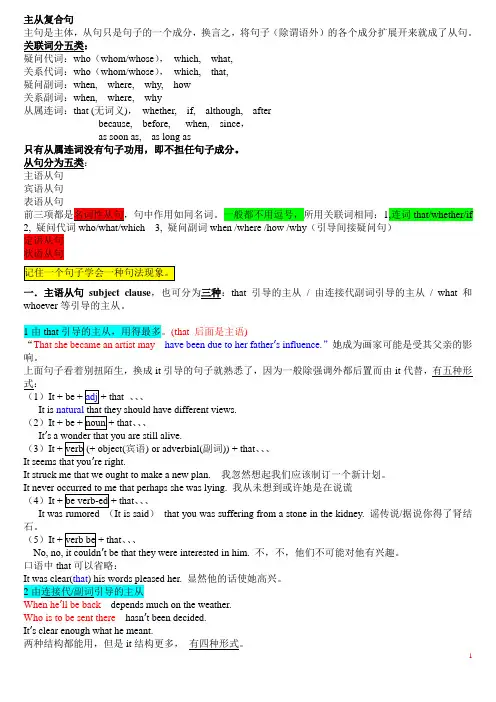
主从复合句主句是主体,从句只是句子的一个成分,换言之,将句子(除谓语外)的各个成分扩展开来就成了从句。
关联词分五类:疑问代词:who(whom/whose),which, what,关系代词:who(whom/whose),which, that,疑问副词:when, where, why, how关系副词:when, where, why从属连词:that (无词义),whether, if, although, afterbecause, before, when, since,as soon as, as long as只有从属连词没有句子功用,即不担任句子成分。
从句分为五类:主语从句宾语从句表语从句前三项都是名词性从句,句中作用如同名词。
一般都不用逗号,所用关联词相同:1,连词that/whether/ifwhen /where /how /why(引导间接疑问句)一.主语从句subject clause,也可分为三种:that引导的主从/ 由连接代副词引导的主从/ what和whoever等引导的主从。
1由that引导的主从,用得最多。
(that 后面是主语)“That she became an artist may have been due to her father’s influence.”她成为画家可能是受其父亲的影响。
上面句子看着别扭陌生,换成it引导的句子就熟悉了,因为一般除强调外都后置而由it代替,有五种形式:(1)+ that 、、、It is(2)、、、It’(3)宾语) or adverbial(副词)) + that、、、’re right.It struck me that we ought to make a new plan. 我忽然想起我们应该制订一个新计划。
我从未想到或许她是在说谎(4)、、、It is said)that you was suffering from a stone in the kidney. 谣传说/据说你得了肾结石。
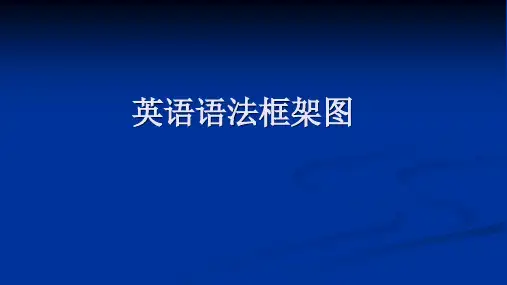
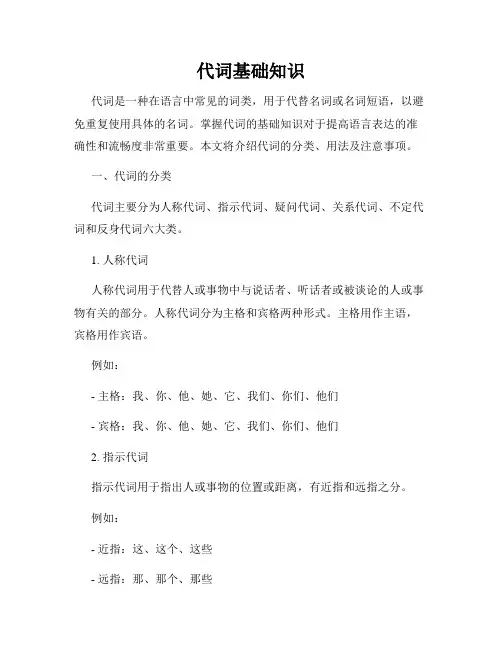
代词基础知识代词是一种在语言中常见的词类,用于代替名词或名词短语,以避免重复使用具体的名词。
掌握代词的基础知识对于提高语言表达的准确性和流畅度非常重要。
本文将介绍代词的分类、用法及注意事项。
一、代词的分类代词主要分为人称代词、指示代词、疑问代词、关系代词、不定代词和反身代词六大类。
1. 人称代词人称代词用于代替人或事物中与说话者、听话者或被谈论的人或事物有关的部分。
人称代词分为主格和宾格两种形式。
主格用作主语,宾格用作宾语。
例如:- 主格:我、你、他、她、它、我们、你们、他们- 宾格:我、你、他、她、它、我们、你们、他们2. 指示代词指示代词用于指出人或事物的位置或距离,有近指和远指之分。
例如:- 近指:这、这个、这些- 远指:那、那个、那些3. 疑问代词疑问代词用于提问的代词。
例如:- 谁、什么、哪个、哪些、多少4. 关系代词关系代词用于引导定语从句,起连接作用。
例如:- 主格:谁、什么、哪个、哪些- 宾格:谁、什么、哪个、哪些5. 不定代词不定代词用于代替不确定或不具体的人或事物。
例如:- 一个、一些、任何人、任何事物、没有人、没有事物6. 反身代词反身代词用于表示动作的主体与受体是同一个人或事物。
例如:- 自己、你自己、她自己二、代词的用法代词在语言表达中有多种用法,包括替代名词、指代特定的人或事物、指示位置或距离、提问、引导定语从句等。
1. 替代名词代词用于替代特定的名词或名词短语,以避免重复使用。
例如:- 我喜欢这本书,它很有趣。
(它替代书名)- 你见过金先生吗?他昨天来过我家。
(他替代金先生)2. 指代特定的人或事物代词用于指代在上下文中已经提到或共同知道的人或事物。
例如:- 我在图书馆看到了李明,他在读一本书。
(他指代李明)3. 指示位置或距离指示代词用于指示或描述事物的位置或距离。
例如:- 这是我的车,那是你的车。
(这和那分别指示不同的车辆)4. 提问疑问代词用于提问,引导疑问句。
中考|英语语法系列-代词,史上最全考点总结!代词是初中英语中非常基础的语法内容,也是历次考试中的高频考点。
下面,我们根据代词的分类来看看每类代词我们都该掌握什么吧!代词的分类:人称代词、物主代词、反身代词、指示代词、关系代词、疑问代词、连接代词、不定代词和相互代词等。
1. 人称代词:人称代词代替人或事物的名称,分为主格和宾格两种形式。
(1)主格用来作句子的主语、表语。
I often go shopping on Sundays.(星期天我常去购物)Are they from Brazil?(他们是巴西人吗?)Where have they gone?(他们上哪儿去了?)It’s he!(是他!)(2)宾格用来作及物动词或者介词的宾语。
Who teaches you English this year?(今年谁教你们的英语?)Help me!(救救我!)We often write letters to her.(我们常给他写信)(3)人称代词作表语或者放在比较状语从句连词than或as之后时,可以用主格形式,也可以用宾格形式,口语中大多用宾格。
–It’s I/me.(是我。
)(4)三个不同人称同时出现,或者主语中包含“我”时,按照“you→he→I”的顺序表达。
Both he and I are working at that computer company.(我和他都在那家电脑公司上班)–Who will go there?(谁要去那儿?)–You and me.(你和我)(5)人称代词it除了可以指人指物之外,还可以表示“时间、天气、温度、距离、情况”等含义,此外还可以作“非人称代词”使用,替代作主语或者宾语的不定式、动名词或者名词性从句。
--What’s the time?(几点啦?)–It’s 12:00.(12点了。
)It’s a long way to go.(那可要走好长的路。
)It took him three days to clean his house.(打扫屋子花了他三天的时间。
(完整版)高中英语代词代词可以分为下列九类1 人称代词(personal pronouns): I You She2 物主代词(Possessive Pronouns): My, His3 自身代词(self pronouns): myself4. 相互代词(reciprocal pronouns): one another, each other5. 指示代词(demonstrative Pronouns):this, that, those, these6. 疑问代词(interrogative pronouns): who, whom, whose, what, which用来构成特殊问句的。
7. 关系代词(relative pronouns): who, whom, whose, that, which等引导定语从句的。
8. 连接代词(conjunctive pronouns):疑问代词都可以用作连接代词,来引起主语从句,宾语从句和表语从句。
9 不定代词(indefinite pronouns): all, each, both等一人称代词人称代词做主语时用主格,做宾语时用宾格。
在作表语时,用宾格较多,例如:Who is knocking at the door? --- It’s me.但在强调结构中却常用主格:It was he who did it.It is she who wants this clothes.在使用人称代词时有下面几点值得注意:1)she可以用来代表国家,船只,大地,月亮等。
e.g. I think England will do what she promised to do.2) 在并列的主语中,I总放在最后。
e.g. Mary and I will be in charge of the case.3) 第三人称,男女两性并用时,男先女后。
He and she still don’t agree to the plan.二物主代词1.1)表语Whose dictionary is this? ----it’s mine.2) 主语Ours is a big family.3) 宾语Let’s clean their room first and ours later.2. “of +名词性物主代词”可用作定语That car of hers is always breaking down.= Her car is …….三11)作宾语I can’t express myself in English.2) 作表语I am not quite myself these days. 我近来身体不大舒服。
一. 词类1). 名词专有名词Proper Nouns普通名词Common Nouns: 可数名词Countable Nouns:个体名词Individual Nouns集体名词Collective Nouns不可数名词Uncountable Nouns:物质名词Mass Nouns or Material Nouns抽象名词Abstract Nouns单数Singular Form 复数Plural Form奇数Odd Number 偶数Even Number名词的所有格the Possessive Case2) 冠词定冠词Definite Article 不定冠词Indefinite Article3) 代词人称代词Personal Pronoun: 第一人称First Person第二人称Second Person第三人称Third Person物主代词Possessive Pronoun 形容词性物主代词Adjectival Possessive Pronoun名词性物主代词Nominal Possessive Pronoun反身代词Reflexive Pronoun 连接代词Conjunctive Pronoun 相互代词Reciprocal Pronoun 不定代词Indefinite Pronoun指示代词Demonstrative Pronoun 疑问代词Interrogative Pronoun 关系代词Relative Pronoun4)形容词品质形容词Qualitative Adjectives 类属形容词Classifying Adjectives 颜色形容词Colour Adjectives 强调形容词Emphasizing Adjectives -ing形容词–ing Adjectives -ed形容词–ed Adjectives合成形容词Compound Adjectives比较级The Comparative Degree 最高级The Superlative Degree5) 数次和量词基数词Cardinal Numbers/Numeral 序数词Ordinal Numbers分数词Fractional Numerals 倍数词Multiplicative Numeral概数Approximate Number 量词Measure Word6)动词及物动词Transitive Verbs 不及物动词Intransitive Verbs双宾动词Ditransitive Verbs 成语动词Phrasal Verbs系动词Link Verbs 助动词Auxiliary Verbs情态动词Model Verbs动词的基本形式现在式Present Tense 过去式Past Tense过去分词Past Participle 现在分词Present Participle限定形式Finite Forms非限定形式Non-Finite Forms: 不定式The Infinitive动名词The Gerund分词The Participle7)副词时间副词Adverbs of Time 方式副词Adverbs of Manner强调副词Emphasizing Adverbs 评论副词Commentary Adverbs 关系副词Relative Adverbs 地点副词Adverbs of Place程度副词Adverbs of Degree 疑问副词Interrrogative Adverbs 连接副词Conjunctive Adverbs 句子副词Sentence Adverbs 8)连词并列连词Coordinating Conjunction从属连词Subordinating Conjunction二. 句子句子成分主语Subject逻辑主语Logical Subject主语补足语Subject Complement宾语Object直接宾语Direct Object间接宾语Indirect Object宾语补足语The Objective Complement状语Adverbial伴随状语Adverbial of Circumstance目的状语A dverbial of Purpose原因状语Adverbial of Cause/Reason结果状语Adverbial of Result时间状语Adverbial of Time条件状语Adverbial of Condition表语Predicative 定语Attribute同位语Appositive 谓语Predicate插入语Parenthesis 呼语V ocative独立主格结构Absolute Construction句子种类1. 说话目的陈述句Declarative Sentence问句Question 一般疑问句General Question特殊疑问句Special Question选择疑问句Alternative Question反意疑问句Disjunctive Question or Tag Question 祈使句Imperative感叹句Exclamation2.结构简单句Simple Sentence并列句Compound Sentence复合句Complex Sentence并列复合句Compound Complex Sentence三.单词,短语和从句1.短语动词短语Verbal Phrases 不定式短语Infinitive Phrases 动名词短语Gerundial Phrases 分词短语Participial Phrases介词短语Prepositional Phrases 名词短语Noun Phrases2.从句主语从句Subject Clause 宾语从句Object Clause表语从句Predicative Clause 同位语从句Appositive Clause 直接引语Direct Speech间接引语Indirect Speech定语从句Attributive Clause关系代词R elative Pronoun关系副词Relative adverb限制性定语从句The Restrictive Attributive Clause非限制性定语从句The Nonrestrictive Attributive Clause 状语从句Adverbial Clause时间状语从句Adverbial Clause of Time地点状语从句Adverbial Clause of Place原因状语从句Adverbial Clause of Cause/Reason目的转语从句Adverbial Clause of Purpose条件状语从句Adverbial Clause of Condition结果状语从句Adverbial Clause of Result让步状语从句Adverbial Clause of Concession比较状语从句Adverbial Cause of Comparison方式状语从句Adverbial Clause of Manner四.构词法转化Conversion 反转构词法Backformation 派生Derivation: 前缀Prefix 后缀Suffix合成Compounding 缩写Abbreviation混合Blending四.时态一般现在时The Simple Present Tense现在进行时The Present Continuous Tense一般将来时The Simple Future Tense一般将来进行时The Simple Future Continuous Tense将来完成时The Future Perfect Tense将来完成进行时The Future Perfect Continuous Tense过去将来时The Past Future Tense过去将来完成时The Past Future Perfect Tense过去将来进行时Past Future Continuous Tense一般过去时The Simple Past Tense过去进行时Past Continuous Tense现在完成时The Present Perfect Tense现在完成进行时The Present Perfect Continuous Tense过去完成时The Past Perfect Tense过去完成进行时The Past Perfect Continuous Tense五.非谓语动词动词不定式the Infinitive动名词Gerund现在分词Present Participle过去分词past participle六.语态,语序被动语态The Passive V oice主动语态The active voice七.特殊句式倒装Inversion完全倒装Complete Inversion部分倒装Partial Inversion省略Ellipsis强调Emphasis插入Parenthesis八.语气(Mood)陈述语气Indicative Mood 疑问语气Interrogative Mood 祈使语气Imperative Mood 虚拟语气Subjunctive Mood 九.标点符号句号Full Stop or Period 感叹号Exclamation Mark分号Semicolon 破折号Dash问号Interrogation Mark Or Question Mark 撇号/单引号Apostrophe引号Quotation Marks 逗号Comma冒号Colon 连字号Hyphen括号Brackets or Marks of Parentheses。
单独句子——疑问代词(5个词)P42,疑问副词(7个词)P130连接句子与“句子”的连接词 名词性从句(4大从句)连词P101从属连词P104“that 、if 、whether 等” 状语从句(9大类)并列连词连接两个分句(4种关系)[对等关系的两个句子]介词P96一些特殊的介词(如but 、except 等) 连接副词连接分句 连接从句(不表疑问)代词P45表疑问连接代词不表疑问 关系代词(6个词) [主、宾、表、定]关系副词(3个词) [状]定语从句[5大成分+1修饰整句]副词P130分句 从句句子注: 特殊点:① 连接代词普通连接代词 ——表疑问(表疑问、究竟)复合式连接代词——不表疑问(表无论、一切、所有)连接副词连接从句的连接副词 连接分句的连接副词P103注意、P130⑨参考《论介词宾语的语法结构》——熊锡源 《介词宾语从句种种》——洪淑治《漫谈英语介词的宾语从句》——袁春松 P96①例句——连接副词不表疑问的 介词宾语从句比较 区别疑问代词区别疑问副词② 既可“表疑问”,也可“不表疑问”的连接词:whomever 、whoever 等。
③ 介词后接(一般接名词或代词)形容词参考 《介词后接形容词的几种情况》——雍和明《论介词宾语的语法结构》——熊锡源从句(作宾语从句)P96①例句参考《论介词宾语的语法结构》——熊锡源 《介词宾语从句种种》——洪淑治《漫谈英语介词的宾语从句》——袁春松④ 既可做“介词”,也可做“连词”的词:for 、since 、until 、before 、after 等。
for介词P93并列连词(因果推理关系)P103介词P93从属连词(时间、原因状从)P105since介词P93~94从属连词(时间状从)P105until 、before 、after⑤既可做“并列连词”,也可做“从属连词”的连词:so、when、while等。
P103、P105⑥同时可引导多种状语从句的从属连词:so、so that、as、since等。
总结十大词性第1篇代词指代替人或物的词代词可划分为9种:人称代词、物主代词、反身代词、不定代词、指示代词、相互代词、疑问代词、关系代词和连接代词。
人称代词:用于直接指代人或者事物的代词第一人称:我第二人称:你第三人称:他、她、它(1)人称代词又有主格和宾格之分。
主格代词:做主语的代词(主动发出动作的人或物)宾格代词:做宾语的代词(被动承受动作的人或物)“我”做主语的时候用I,做宾语的时候用me“我们”做主语的时候用we,做宾语的时候用usI love him:“我”做的是主语,因此用I,“他”做的是宾语,用的是him,而不能用he。
表示所属关系的代词叫做物主代词,也叫人称代词的所有格。
它表示谁谁的,物体的主人。
它一般加在普通名词的前面。
物主代词分为:形容词性物主代词和名词性物主代词两种。
形容词性物主代词(是个形容词),如你的your,我的my,他的his。
名词性物主代词(是个名词),如你的东西yours,我的东西mine,他的东西his。
“反”就是反过来,“身”就是本身,“反身”就是反过来指代谁谁本身。
当一个动作的发出者和承受者是同一个人,承受者就要用反身代词。
如:I hurt myself. 人称代词、物主代词、反身代词汇总表:“不定”是不确定的意思,就是指定的人或者东西不确定是什么。
指示代词是用来指示或标识人或事物的代词。
8个指示代词包括this(这个)、that(那个)、these(这些)、those(那些)、it(它)、such(这样的)、same(同样的)、so(如此)。
相互代词就是“彼此”,用于表示两个或多个人或物之间的相互关系。
相互代词只有两个词组,两者之间用each other、两者以上之间用one another。
用来提问的代词。
如:what,who等。
关系代词指的是代表引导词,同时在从句中作一定的句子成分。
关系代词有主格、宾格和属格(所有格)之分,并有指人与指物之分。
关系代词用来引导定语从句。
英语词类英语中的词可以根据词义、语法功能和形式特征分为十大类,即名词(noun)、代词(pronoun)、形容词(adjective)、副词(adverb)、动词(verb)、数词(numeral)、冠词(article)、介词(preposition)、连词(conjunctions)和感叹词(int erjection)。
英语代词的用法全归纳一、定义与分类代词是代替名词及起名词作用的短语或句子的词。
代词根据其意思和用法可分为人称代词、物主代词、反身代词、指示代词、相互代词、疑问代词、连接代词、关系代词、不定代词九类。
综观历年高考情况,在这九类代词中,不定代词一直是高考英语的重点。
二:人称代词,物主代词,反身代词用法概述这三种代词都有人称(第一、二、三人称)的变化、数(单、复数)的变化,性(阴性、阳性、中性)以及格(主格、宾格)的变化。
物主代词又包括两种形式:形容词性物主代词和名词性物主代词。
特别注意:形容词性物主代词its没有相应的名词性物主代词。
这三种代词的形式变化表如下:三、人称代词的用法1) 定义:人称代词是用来指代人、动物或事物的代词。
它必须在人称(第一人称、第二人称、及第三人称)、数(单数、复数)以及性(阴性、阳性、中性)三方面与被指代的名词一致。
如:I am a student. Tom is a boy, and he is a student. Mary is very pretty, and she likes singing.The boys are students, and they are in the room.The doy is small. It is Tom's.2)人称代词的句法功能A) 人称代词有主格和宾语之分:主格用作主语,宾格用作宾语。
B) 人称代词的主格形式在在句中作主语和表语。
如: I like music(主语). She is a teacher.(主语)She and I are good friends(主语).Neither she nor I am student.——I saw the boys this morning.——Are you sure it was they(表语)?C) 人称代词的宾格在句子作动词的宾语,或者介词的宾语。
单独句子——疑问代词(5个词)P42,疑问副词(7个词)P130
连接
句子与“句子”的
连接词 名词性从句(4大从句)
连词
P101
从属连词
P104
“that 、if 、whether 等”
状语从句(9大类)
并列连词
连接两个分句(4种关系)
[对等关系的两个句子]
介词
P96
一些特殊的介词(如but 、except 等)
连接副词
连接分句
连接从句
(不表疑问)
代词
P45
表疑问
连接代词
不表疑问 关系代词(6个词) [主、宾、表、定]
关系副词(3个词) [状]
定语从句
[5大成分+1修饰整句]
副词
P130
分句 从句
句子
注: 特殊点:
① 连接代词普通连接代词 ——表疑问
(表疑问、究竟)
复合式连接代词——不表疑问
(表无论、一切、所有)
连接副词
连接从句的连接副词
连接分句的连接副词
P103注意、P130⑨
参考
《论介词宾语的语法结构》——熊锡源 《介词宾语从句种种》——洪淑治
《漫谈英语介词的宾语从句》——袁春松 P96①例句——连接副词
不表疑问的 介词宾语从句
比较 区别疑问代词
区别疑问副词
② 既可“表疑问”,也可“不表疑问”的连接词:whomever 、whoever 等。
③ 介词后接
(一般接名词或代词)
形容词
参考 《介词后接形容词的几种情况》——雍和明
《论介词宾语的语法结构》——熊锡源
从句(作宾语从句)
P96①例句
参考
《论介词宾语的语法结构》——熊锡源 《介词宾语从句种种》——洪淑治
《漫谈英语介词的宾语从句》——袁春松
④ 既可做“介词”,也可做“连词”的词:for 、since 、until 、before 、after 等。
for
介词P93
并列连词(因果推理关系)P103 介词P93
从属连词(时间、原因状从)P105
since
介词P93~94
从属连词(时间状从)P105
until 、before 、after
⑤既可做“并列连词”,也可做“从属连词”的连词:so、when、while等。
P103、P105
so区别并列连词(因果推理关系)
从属连词(结果状语从句)
参考《英语中用从句、分句和句子的连接表示原因的方法》——裴育新
when、while 并列连词(转折关系)从属连词(时间状从)
⑥同时可引导多种状语从句的从属连词:so、so that、as、since等。
P105
so、so that 结果状从
目的状从
so......that
such......that
结果状从as
时间状从
原因状从
比较状从
方式状从
since
时间状从
原因状从
⑦《谈名词、副词、分词和短语作从属连词的现象》——赵莉。